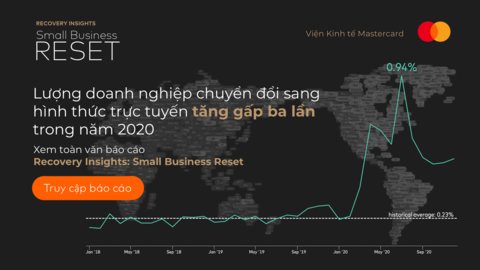
Mastercard’s latest report revealed the impact of COVID-19 on business in the Asia-Pacific region. — Mastercard's Infographic
Despite the pandemic, 35 per cent more new small businesses entered the Asia-Pacific market in 2021, compared to 2020.
While Mastercard’s latest report revealed that sales at small-and-medium-sized businesses (SMBs) lagged behind larger companies by up to 20 per cent at the peak of the crisis, 2021 has shown some positive trends.
Total sales at SMBs rose 4.5 per cent through to August 2021 compared to the same period in 2020. E-commerce sales grew 31.4 per cent globally.
The report, entitled Recovery Insights: Small Business Reset, was conducted in 19 markets around the world. It focused on the impact and recovery from COVID-19 on small businesses globally.
“While businesses of all sizes were adversely impacted by the pandemic, due to a lack of local SMB support and digital infrastructure in the Asia-Pacific (APAC) region, SMBs experienced far greater hardships at the outset,” said David Mann, Chief Economist, AP and MEA, Mastercard Economics Institute (MEI).
“Against a backdrop of mobility restrictions and zero COVID strategies, e-commerce was a lifeline for organisations to ride out the pandemic. This accelerated digital shift has paved the way for the next generation of entrepreneurs, and we’ve seen a surge in newcomers capitalising amidst the disruption,” added Mann.
Using MEI’s Small Business Performance Index of aggregated and anonymised sales activity within the Mastercard network, the report identifies several key trends:
Closures: In APAC, small businesses that closed early in the pandemic were about twice as likely as larger businesses to remain closed long term.
E-Commerce: Following lockdowns, the number of businesses going online each month tripled from pre-pandemic levels, peaking in July 2020, reflecting an increased demand for online sales.
Entrepreneurship: Roughly 35 per cent more small retailers in APAC established operations year on year, a slight increase on the global average of 32 per cent. In the same period, only 4 per cent of large firms were created. This trend is most strongly reflected in Australia (+73 per cent), Japan (+38 per cent) and Thailand (+29 per cent).
Location: As tourists and workers stay closer to home, small businesses in commercial districts are seeing sales suffer, while sales within more residential neighbourhoods grew.
Sectors - Restaurants & Lodging: Small lodging businesses outperformed larger establishments by a wide margin through 2020 and 2021. The trend to stay local has benefited small lodging companies and hurt big city big hotels. Restaurants were a different story, with SMB eateries underperforming large ones globally by roughly 17 percentage points in 2021.
Supporting small business owners is a continued priority for Mastercard, which pledged to bring 50 million small businesses and 25 million women entrepreneurs into the digital economy by 2025. Mastercard also works closely with governments, businesses and other organisations around the world to create programs and policies that allow small businesses to flourish. — VNS